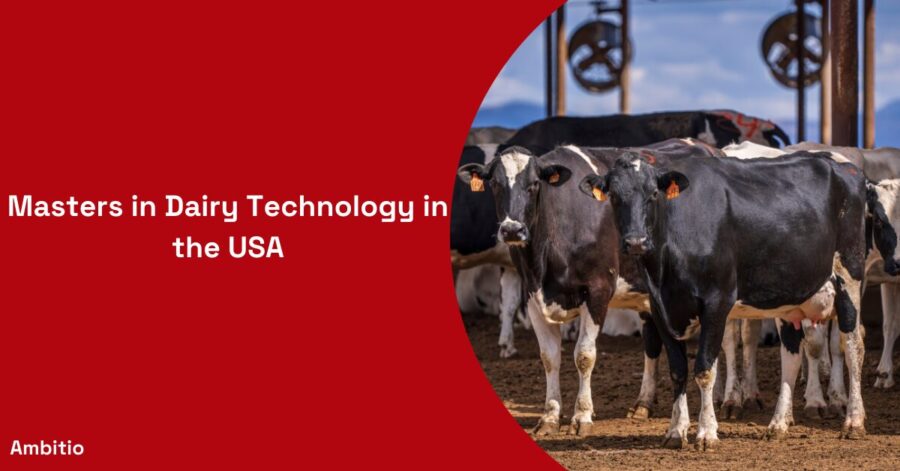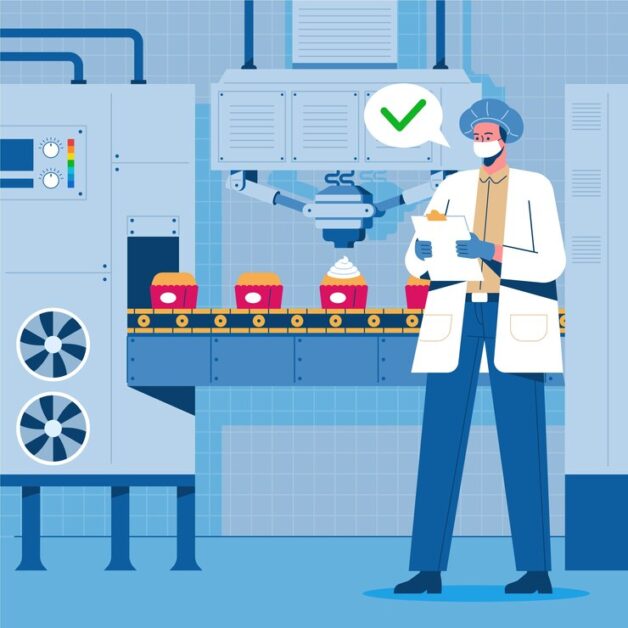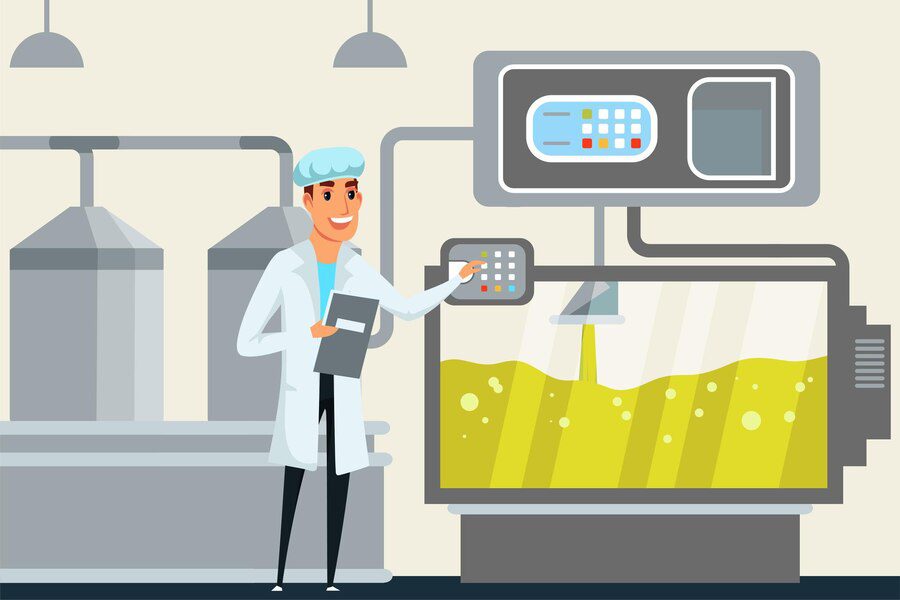11 December 2024
9 minutes read
Masters in Dairy Technology in the USA

KEY TAKEAWAYS:
- Select programs with strong industry partnerships.
- Gain hands-on experience through internships.
- Connect with dairy technology professionals and organizations.
The realm of dairy science is rapidly evolving, positioning itself at the forefront of agricultural innovation and food technology.
This article delves into the intricate world of dairy science, focusing on Master of Science (M.S.) programs offered by prestigious universities in the USA.
We will explore the various facets of these programs, including course structure, admission requirements, scholarship opportunities, and the rich career paths they pave.
With a spotlight on top-ranking universities and their unique offerings, this guide aims to be an essential resource for aspiring dairy science professionals.
Understanding Dairy Technology
Dairy technology is an integral part of the agricultural sciences, focusing on the production, processing, and distribution of dairy products.
It combines principles of animal science, chemistry, microbiology, and nutrition to ensure the quality and safety of milk and milk-based products.
This section explores the multifaceted world of dairy technology, its evolution, and the pivotal role played by dairy technologists.
What is Dairy Technology?
- Definition: Dairy technology involves the comprehensive study and application of scientific methods to manage and improve the dairy production chain, from farm to table.
- Scope: It encompasses various stages including milk collection, processing, packaging, storage, distribution, and quality control of dairy products.
Historical Evolution and Modern Advancements
- Traditional Methods: Initially, dairy production was predominantly manual, focusing on basic milk collection and rudimentary processing techniques.
- Technological Integration: Advancements in technology have revolutionized dairy processes, introducing automated milking systems, pasteurization, homogenization, and advanced refrigeration methods.
- Innovative Products: Modern dairy technology also involves the development of new dairy products, like lactose-free milk, probiotic dairy products, and fortified dairy foods.
The Role of Dairy Technologists
- Job Responsibilities: Dairy technologists are responsible for overseeing the entire dairy product lifecycle. Their roles include ensuring product quality, developing new dairy products, and implementing sustainable practices in dairy processing.
- Quality Control and Safety: They play a crucial role in maintaining the safety and quality of dairy products, adhering to strict health standards and regulatory requirements.
- Research and Development: Dairy technologists engage in research to improve dairy processing techniques, enhance product quality, and develop innovative dairy products.
- Sustainability and Environmental Impact: A key aspect of their role is to address environmental concerns, focusing on sustainable practices in dairy farming and processing to reduce the ecological footprint.
Impact on the Dairy Industry and Food Technology
- Industry Efficiency: The expertise of dairy technologists has significantly improved the efficiency of dairy production, enhancing product yield and quality.
- Food Safety and Public Health: They ensure the safety of dairy products, which is crucial for public health, mitigating the risks of foodborne illnesses.
- Consumer Trends and Innovation: Keeping pace with consumer trends, dairy technologists are at the forefront of creating healthier, more sustainable, and diverse dairy products, catering to changing consumer preferences.
Top Universities Offering Masters in Dairy Technology in the USA

| University Name | Location | Program Highlights | Tuition Fees (approx.) | Unique Aspects |
|---|---|---|---|---|
| University of Wisconsin-Madison | Wisconsin | Comprehensive coursework, a strong focus on research and innovation | $12,000 – $25,000 per year | Renowned for its pioneering research in dairy science, strong industry connections |
| Virginia Polytechnic Institute and State University (Virginia Tech) | Virginia | Emphasis on dairy production systems, animal nutrition, and food safety | $13,000 – $24,000 per year | Offers extensive hands-on experience with modern dairy processing technologies |
| University of California, Davis | California | Advanced training in dairy food science, product development, and quality management | $11,000 – $26,000 per year | Known for its state-of-the-art dairy research and processing facilities |
| Cornell University | New York | Focus on dairy microbiology, chemistry, and engineering | $29,000 – $38,000 per year | Prestigious Ivy League institution with a strong emphasis on dairy product innovation |
| University of Minnesota | Minnesota | Specialization in dairy cattle management, dairy foods, and public health | $15,000 – $28,000 per year | Offers a unique blend of theoretical knowledge and practical skills in dairy technology |
| Penn State University | Pennsylvania | A diverse range of courses including dairy chemistry, economics, and sustainability | $20,000 – $35,000 per year | Known for its research in dairy production and sustainability practices |
| Michigan State University | Michigan | Comprehensive curriculum covering dairy genetics, nutrition, and business management | $14,000 – $27,000 per year | Features collaborative research projects with leading dairy industries |
| Kansas State University | Kansas | Focus on dairy product processing, quality assurance, and food safety | $10,000 – $22,000 per year | Offers a balanced approach to dairy science and technology with strong industry ties |
| University of Idaho | Idaho | Specialization in dairy production management and animal health | $9,000 – $20,000 per year | Recognized for its research in dairy cattle health and welfare |
Course Structure and Curriculum
| Curriculum Component | Description | Examples | Remarks |
|---|---|---|---|
| Core Courses | Fundamental subjects that provide a broad understanding of dairy science. | – Dairy Chemistry – Dairy Microbiology – Animal Nutrition – Food Safety and Quality | These courses are mandatory and form the foundation of the program. |
| Specializations | Areas of focus allow students to tailor their education to specific interests. | – Dairy Product Innovation – Dairy Farm Management – Dairy Processing Technology – Dairy Genetics | Students can choose one or more specializations based on career goals. |
| Research Component | Opportunities to engage in original research under faculty guidance. | – Master’s Thesis – Research Projects – Laboratory Work | Encourages development of research skills and contributes to the field. |
| Practical/Hands-On Training | Real-world experience through internships, fieldwork, and on-campus facilities. | – Internships at Dairy Plants – Field Trips to Dairy Farms – Work in University Dairy Processing Plants | Provides practical experience and industry exposure. |
| Seminars and Workshops | Regular sessions for knowledge exchange and staying updated with industry trends. | – Guest Lectures – Industry Conferences – Workshops on Advanced Dairy Technologies | Facilitates learning beyond the classroom and networking opportunities. |
| Elective Courses | Optional courses that complement the core curriculum and specializations. | – Dairy Economics – Animal Welfare – Environmental Impact of Dairy Production – Advanced Food Microbiology | Allows customization of the curriculum to suit individual interests and career paths. |
| Capstone Project | A culminating project that demonstrates mastery of the subject matter. | – Industry Consultancy Project – Comprehensive Dairy Plant Design – Product Development Project | Integrates learning and prepares students for professional challenges. |
QUICK ADVICE:
- Research and Choose Wisely: Highlight the importance of thorough research when selecting the right program. Emphasize looking beyond rankings to consider curriculum relevance, faculty expertise, networking opportunities, and the program’s alignment with career goals.
- Experience Matters: Stress the value of gaining relevant experience, either through internships, part-time jobs, or relevant projects, before and during the program. Real-world experience can enhance learning, make the coursework more relatable, and improve job prospects upon graduation.
- Leverage Networking Opportunities: Encourage students to take advantage of the networking opportunities that come with studying in the USA. This can include joining professional organizations, attending industry conferences, and engaging with alumni networks. Connections made during their studies can be invaluable for career development and job hunting after graduation.
Admission Requirements and Process for Masters in Dairy Science Programs
Gaining admission to a Masters in Dairy Science program in the USA involves meeting certain academic and professional prerequisites, as well as navigating a thorough application process.
This section provides an in-depth look at these requirements and offers guidance to help prospective students successfully apply to their desired programs.
Academic Prerequisites
- Bachelor’s Degree: Applicants must hold a bachelor’s degree from an accredited institution, preferably in a related field such as agriculture, animal science, food science, biology, or a similar discipline.
- Coursework Requirements: Many programs require foundational knowledge in subjects like microbiology, chemistry (organic and inorganic), biochemistry, and animal biology. Applicants need to have a strong background in these areas.
- GPA Requirements: Most universities expect a minimum undergraduate GPA, often around 3.0 on a 4.0 scale. However, some programs may have higher requirements or offer conditional admission for candidates with lower GPAs under special circumstances.
Professional Prerequisites
- Relevant Experience: While not always mandatory, relevant work experience in the dairy industry, agriculture, food processing, or research can significantly strengthen an application.
- Internships and Research: Prior internships or research experience in dairy science or related fields demonstrate practical skills and a commitment to the discipline.
Application Process
- Application Form: The initial step is to complete the university’s application form, which typically includes personal information, educational background, and a statement of purpose.
- Statement of Purpose: This is a critical component where candidates articulate their interest in dairy science, career objectives, and why they are choosing a particular program.
- Letters of Recommendation: Most programs require two to three letters of recommendation, preferably from academic advisors or professionals in the field who can attest to the candidate’s abilities and potential.
- Standardized Test Scores: Some universities may require GRE scores. If English is not the applicant’s first language, TOEFL or IELTS scores are often necessary to demonstrate English proficiency.
- Resume/CV: A detailed resume or CV outlining educational qualifications, work experience, internships, research projects, and any relevant publications or presentations.
- Interviews: Some programs may conduct interviews (either in-person or virtual) as part of the admissions process.
Additional Components
- Portfolio or Past Work: Depending on the program’s focus, applicants might need to submit a portfolio or examples of previous work related to dairy science.
- Application Fee: Most universities charge an application fee, which varies by institution.
Application Tips
- Early Preparation: Start preparing your application well in advance. This includes requesting transcripts, securing letters of recommendation, and preparing for any required tests.
- Tailor Your Application: Customize your statement of purpose and other application materials to align with each program’s specific focus and strengths.
- Research Faculty: Identify faculty members whose research interests align with yours and mention this in your application, showing that you are informed and enthusiastic about the program.
Deadlines and Timelines
- Each university has its application deadlines, usually several months before the start of the semester. It’s crucial to check these dates and submit all materials on time.
- Admission decisions can take several weeks to a few months post the application deadline.
Post-Admission Requirements
- Visa Process: International students will need to apply for a student visa upon acceptance.
- Financial Documentation: Proof of financial support may be required for the visa process and university records.
Financial Considerations and Scholarships
Tuition and Living Expenses
| Expense Category | Average Cost (per year) | Remarks |
|---|---|---|
| Tuition Fees | $20,000 – $38,000 | Varies based on the university, program prestige, and location. |
| Living Expenses | $12,000 – $20,000 | Includes accommodation, food, transportation, and personal expenses. Cost depends on the city and lifestyle. |
| Books and Supplies | $1,000 – $2,000 | Cost of textbooks, lab supplies, and other academic materials. |
| Health Insurance | $1,500 – $3,000 | Mandatory for most students; varies by university and coverage. |
| Miscellaneous Expenses | $2,000 – $5,000 | Includes personal expenses, leisure, travel, and other unforeseen costs. |
Scholarship Opportunities and Financial Aid
| University | Scholarship Name | Aid Offered | Eligibility Criteria | Remarks |
|---|---|---|---|---|
| University of Wisconsin-Madison | Wisconsin Distinguished Graduate Fellowship | Full Tuition + Stipend | Outstanding academic record, research potential | Highly competitive, for exceptional candidates |
| Virginia Tech | Dairy Science Graduate Scholarship | Varies (Partial to Full Tuition) | Merit-based, departmental nomination | Offered to students with strong academic and research profiles |
| University of California, Davis | UC Davis Graduate Scholarships | Up to $30,000 | Academic excellence, leadership potential | Includes several scholarships; some require separate applications |
| Cornell University | Cornell Graduate School Fellowships | Varies (Partial to Full Tuition) | Academic merit, research excellence | Several fellowships are available under the graduate school |
| University of Minnesota | Minnesota Dairy Leaders Scholarship | Up to $10,000 | Leadership qualities, commitment to the dairy industry | Focuses on students who demonstrate leadership in dairy science |
| Penn State University | College of Ag Sciences Scholarships | Varies | Academic achievement, financial need | Multiple scholarships available with different criteria |
| Michigan State University | CANR Graduate Scholarships | Up to $5,000 | Academic performance, research involvement | For students in the College of Agriculture and Natural Resources |
| Kansas State University | K-State Graduate School Scholarships | Varies | Merit and need-based | A wide range of scholarships offered through the graduate school |
| University of Idaho | Idaho Dairy Science Graduate Award | Partial Tuition | Academic merit, research interest in dairy science | Aimed at supporting students in dairy-related research |
Career Pathways After Graduation

| Career Pathway | Description | Average Salary (annually) | Notes |
|---|---|---|---|
| Dairy Production Manager | Oversees operations of dairy farms, focuses on herd health, and productivity. | $65,000 – $85,000 | Requires strong management skills and knowledge of animal husbandry. |
| Quality Assurance Manager | Ensures dairy products meet health standards and regulations. | $60,000 – $80,000 | Involves working closely with production teams and regulatory bodies. |
| Dairy Processing Plant Supervisor | Manages the processing of milk and dairy products. | $58,000 – $75,000 | Technical knowledge of processing equipment and operations is crucial. |
| Research Scientist (Dairy Science) | Conducts research in dairy science, such as product development or nutrition. | $70,000 – $100,000 | Often requires a Ph.D. for advanced research roles; universities and private companies are key employers. |
| Product Development Scientist | Develops new dairy products, from concept to commercialization. | $65,000 – $90,000 | Creativity and an understanding of market trends are essential. |
| Dairy Nutritionist | Specializes in animal nutrition, focusing on improving dairy cattle diets. | $62,000 – $85,000 | Requires in-depth knowledge of animal physiology and nutrition. |
| Regulatory Affairs Specialist | Ensures compliance with food safety and quality regulations in the dairy industry. | $55,000 – $78,000 | Involves staying updated with changing regulations and implementing compliance strategies. |
| Extension Agent | Works with farmers and dairy producers to improve practices and productivity. | $50,000 – $70,000 | Roles often in government or cooperative extensions; strong communication skills are vital. |
| Academic Instructor/Professor | Teaches dairy science courses at colleges and universities. | $55,000 – $95,000 | Requires advanced knowledge in dairy science; a Ph.D. is often necessary for professor roles. |
Conclusion
In conclusion, a Master’s in Dairy Science opens a multitude of doors in the world of agriculture, food technology, and beyond.
This guide provides a comprehensive overview of what aspiring students need to know, from selecting the right program to navigating post-graduation careers.
We encourage you to delve into this dynamic field and explore the possibilities that a degree in dairy science offers.
Join Ambitio for a transformative learning adventure in the USA! Surround yourself with inspiration, share stories globally, and embrace hands-on education. Your journey starts here – Study in USA. Dive into the success stories of students who’ve secured spots in some of the most prestigious institutions in the USA. Get inspired, compare profiles, and discover what it takes to join the ranks of these top admits.
FAQs
What are the prerequisites for enrolling in an M.S. in Dairy Science program?
Most programs require a bachelor’s degree in a related field (like agriculture, biology, or food science), along with specific coursework in areas such as microbiology, animal science, and chemistry. Some programs may also require relevant work experience or internships in the dairy industry.
How long does it typically take to complete a Master of Dairy Science degree?
The duration can vary, but typically, a full-time student can complete an M.S. in Dairy Science in about 2 to 3 years. This timeframe includes coursework, research projects, and sometimes a thesis or final project.
Are there scholarships available for students pursuing a Master’s in Dairy Science?
Yes, many universities offer scholarships specifically for students in dairy science programs. These can be merit-based or need-based, and some are offered by external organizations related to the agriculture and dairy industries.
What career opportunities are available after completing a Master’s in Dairy Science?
Yes, many universities offer scholarships specifically for students in dairy science programs. These can be merit-based or need-based, and some are offered by external organizations related to the agriculture and dairy industries.
How important is the ranking of the university in choosing a Dairy Science program?
University ranking can be a factor in choosing a program, as it often reflects the quality of education, research facilities, and industry connections. However, it’s also important to consider other factors like program curriculum, faculty expertise, location, and available resources that align with your career goals.

You can study at top universities worldwide!
Get expert tips and tricks to get into top universities with a free expert session.
Book Your Free 30-Minute Session Now! Book a call now




























